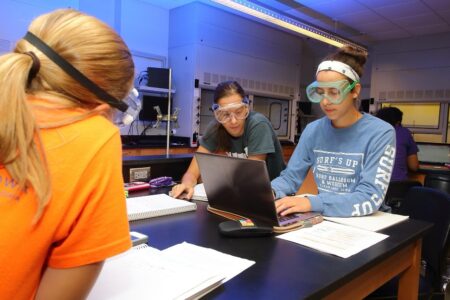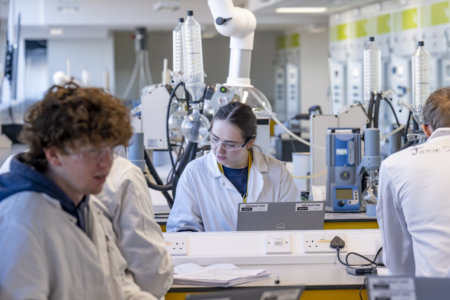
What causes drug resistance in cancer treatment? How can we design more efficient catalysts for clean energy? What’s behind the stability of new battery materials? These are the kinds of real-world challenges researchers are working to solve.
Take, for example, a recent breakthrough made by an international team of scientists who developed a safer alternative to PFAS (perfluoroalkyl substances) — synthetic chemicals widely used for their water- and stain-resistant properties but known to pose serious risks to human health and the environment. Their success was built on a deep understanding of chemical structures and reactivity.
Postgraduate chemistry education can equip you with the same know-how. Programmes often include time in labs, collaboration across disciplines, use of latest instrumentation, and the tackling of pressing issues. From developing targeted cancer therapies to creating biodegradable plastics, a master’s or PhD in this field will train you for these and more. For those ready to push boundaries and drive real change, the following universities offer great postgraduate programmes in chemistry:

UCL’s chemistry postgraduate programmes offer hands-on research experience, helping students boost their careers no matter their goals. Source: University College London
University College London
What does it take to be at the forefront of scientific innovation for nearly two centuries? At UCL, the answer lies in a relentless commitment to research, a global outlook, and a passion for solving real-world problems. Founded in 1826, UCL has grown into one of the world’s most respected institutions right in the heart of the UK’s exciting capital.
Ranked ninth in the QS World University Rankings 2025, UCL consistently earns its place among the world’s best higher education institutions. Its Chemistry Department stands out as one of the most innovative, now ranked eighth in Europe and fifth in the UK. It’s also the second-best in the UK for research impact. With over 50 academic staff members (many of them globally influential award winners), this is a department made of trailblazers in many areas, from organic synthesis and chemical biology to nanotechnology, materials chemistry, and computational chemistry.
For those looking to be part of the next big breakthrough, the department’s postgraduate programmes offer a clear path. The MSc Materials for Energy and Environment gives you with a strong foundation in energy and materials science — both of which are increasingly in demand as countries race to meet climate targets. Meanwhile, the MSc Sustainable Chemistry focuses on low-impact, energy-efficient molecular assembly, equipping you to develop greener alternatives for industry.
A deep integration with research is part of the DNA of these programmes. Half of the MSc experience is spent in a leading research group, working on projects that push the boundaries of current knowledge. This hands-on model readies you for a PhD or high-level roles in industry, while also building critical thinking, independence, and professional resilience. Ready to dive into cutting-edge science and make an impact? Register your interest in studying at UCL’s chemistry department today.

Michigan State University’s Department of Chemistry has been a leader in chemistry research and teaching since its inception. Source: Michigan State University
Michigan State University
Michigan State University’s (MSU) Department of Chemistry has built a strong reputation for excellence in research and teaching since its founding in 1964. Over the decades, it has grown into a nationally respected department, supported by state-of-the-art facilities and a vibrant academic community committed to advancing chemical science.
A wide range of programmes leading to MS and PhD degrees are available here. Areas of study include Analytical Chemistry, Organic Chemistry, Biological Chemistry, Chemical Physics, Inorganic Chemistry, Nuclear Chemistry, Physical Chemistry, and Theoretical and Computational Chemistry.
With over 200 graduate students and over US$9 million in annual research funding, this is a vibrant department. It makes for an environment conducive for cutting-edge science — from molecular biology to materials science.
Another key strength of the department is its expansive research facility. The 280,000–square-foot Chemistry Building houses everything needed for serious academic inquiry — lecture halls, faculty offices, and advanced laboratories — all spread across five floors, two basements, and a penthouse complex. This space has been intentionally designed to support both teaching and research at the highest levels.
Equally impressive is the range of specialised equipment available to graduate students and faculty. The department’s core facilities include the Max T. Rogers Nuclear Magnetic Resonance Facility, the Chemistry Visualisation Facility, the MSU Shared Laser Facility, and the X-ray Facility.
These resources support various research activities, including compound characterisation, structural analysis, and high-level computational modelling. Together, they create a space where you can gain hands-on experience using the same tools and technologies found in top research labs and industry settings.

Tulane University’s Department of Chemistry equips students with the skills needed for successful careers in chemistry or related fields. Source: Tulane University
Tulane University
In the heart of New Orleans, Tulane University’s Department of Chemistry has been shaping scientific minds and advancing research since 1834. Here, students receive the kind of personal attention often found at small colleges while benefiting from the vast resources of a major research institution. Whether developing new spectroscopic tools or engineering “smart” therapeutics, faculty and students work together to solve real-world problems through chemistry.
The learning here is hands-on and practical. The department emphasises hands-on learning, critical thinking, and a strong foundation in scientific principles. Both undergraduate and graduate students are encouraged to explore research early on and are supported by faculty who are not only leaders in their fields but also dedicated mentors. The goal is clear: to equip students with the skills and experience they need to become leading innovators in the physical and biological sciences, in order to ultimately assume positions of leadership in academia and industry.
Tulane’s graduate programmes in chemistry offer a carefully balanced approach. In their first year, students take core courses while meeting with faculty to identify research interests and select a dissertation advisor. After this initial phase, the programme shifts its focus to independent research, allowing students to contribute original work to their chosen field.
Research within the department spans a wide range of specialities, including bio-organic, medicine, organic polymeric materials, synthetic bioinorganic, nanotechnology, transition metal catalysis, electrochemical catalysis, biophysics, ultrafast laser spectroscopy, and development of optical and magnetic materials.
Supporting these efforts is a suite of advanced instrumentation, such as high field NMR spectrometres, a variety of mass spectrometres, sophisticated magnetochemical instruments, powder and single crystal x-ray diffraction instruments and ultrafast optical spectroscopy systems. The university continues to invest in expanding these facilities and recruiting new faculty, particularly in growing areas like sustainability and medicinal chemistry.

The School of Chemistry at Trinity College Dublin has evolved significantly since its first lecturer was appointed in 1711. Source: Trinity College Dublin
Trinity College Dublin
A postgraduate degree in chemistry can open doors to industries shaping the future, and few places prepare you for that better than Trinity College Dublin’s School of Chemistry. Ranked 81st globally by the QS World University Rankings 2024, Trinity is home to one of the oldest chemistry departments in the world, founded in 1711.
Today, it’s a research powerhouse, with projects spanning every sub-discipline of chemistry. Researchers at the School actively contribute to national and international collaborations, supported by an annual research income of around five million euros from public and commercial sources.
By entering the School of Chemistry, you join a dynamic, research-focused community that includes academics, Fellows Emeriti, researchers, and postgraduate students. Through Dublin Chemistry — a joint graduate initiative between Trinity and University College Dublin — you are connected to a broader academic network.
The MSc in Energy Science is one of the school’s top offerings, designed to give you both the theoretical foundation and hands-on training for careers in the global energy sector. You will learn from lecturers who are active members of international organisations such as the RSC, ACS, IoP, and IMEC, ensuring strong industry relevance.
Small class sizes mean you receive personal guidance from the same academics leading major research efforts. Many are based in institutes like the Trinity Biomedical Sciences Institute or the 40 million euros AMBER Centre, which focuses on materials science and bioengineering. This blend of education and real-world research experience helps bridge the gap between academia and industry.
You also benefit from access to high-spec instruments that support advanced material characterisation, such as NMR, mass spectrometry (ToF and ESI), and equipment for X-ray crystallography. Considering all of these, it’s little wonder that 94% of MSc Energy Science graduates find employment in the energy sector upon completing the programme.
*Some of the institutions featured in this article are commercial partners of Study International










